Discover top guides, trends, tips and expertise from AIO Writers
What Is a Keyword Research Report? [+ How to Create One]
Julia McCoy
Tuesday, 4th Apr 2023
Almost half of all marketers report that organic search is the marketing channel with the highest ROI.
In fact, SEO reduces the cost of customer acquisition by over 87%.
These statistics show that the keys to lowering your marketing costs are identifying the keywords that your target audience is searching for and optimizing for them.
The fact that over 90% of web pages get no organic traffic from Google brings the importance of SEO into even sharper focus.
Not just SEO, but organized, strategic SEO with trackable metrics and measurable goals.
One way to get organized and strategic? Compile a keyword research report from your keyword research tools.
Let’s talk about what goes into a keyword research report, why you must compile one, and the steps to follow when writing one. That way, your SEO will be more likely to bring in results.
Table Of Contents:
- What is a Keyword Research Report?
- Why is a Keyword Research Report Essential?
- How to Create a Keyword Research Report
- Create Content Straight from Your Keyword Research Report
- FAQs – Keyword Research Reports
- Conclusion
What is a Keyword Research Report?
A keyword research report lists all the keyword ideas you intend to target in your SEO or content strategy against important metrics: search volume, search intent, and ranking difficulty. It offers a detailed view of the topics your target audience is searching for online.
The main aim of a keyword research report is to determine the search terms that will draw qualified traffic to your website or blog. A keyword research spreadsheet should include:
- The intent behind each query.
- How many people on average are searching Google for it each month.
- The ease or difficulty of ranking for that keyword.
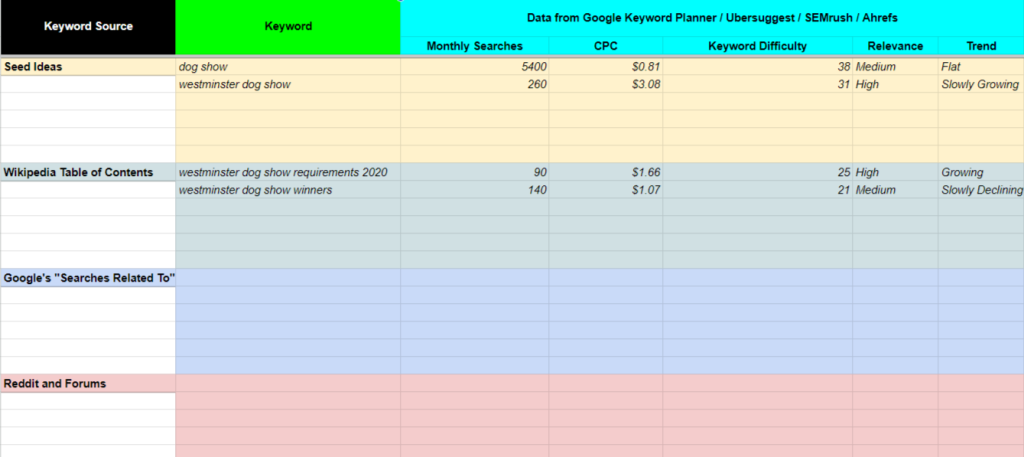

An example of a keyword research report via Backlinko
A keyword research report can also include an analysis of how each keyword on the list has trended in search engines over time. Trends determine if there’s any seasonal variation in interest levels. Interest in some topics peaks at certain times of the year.
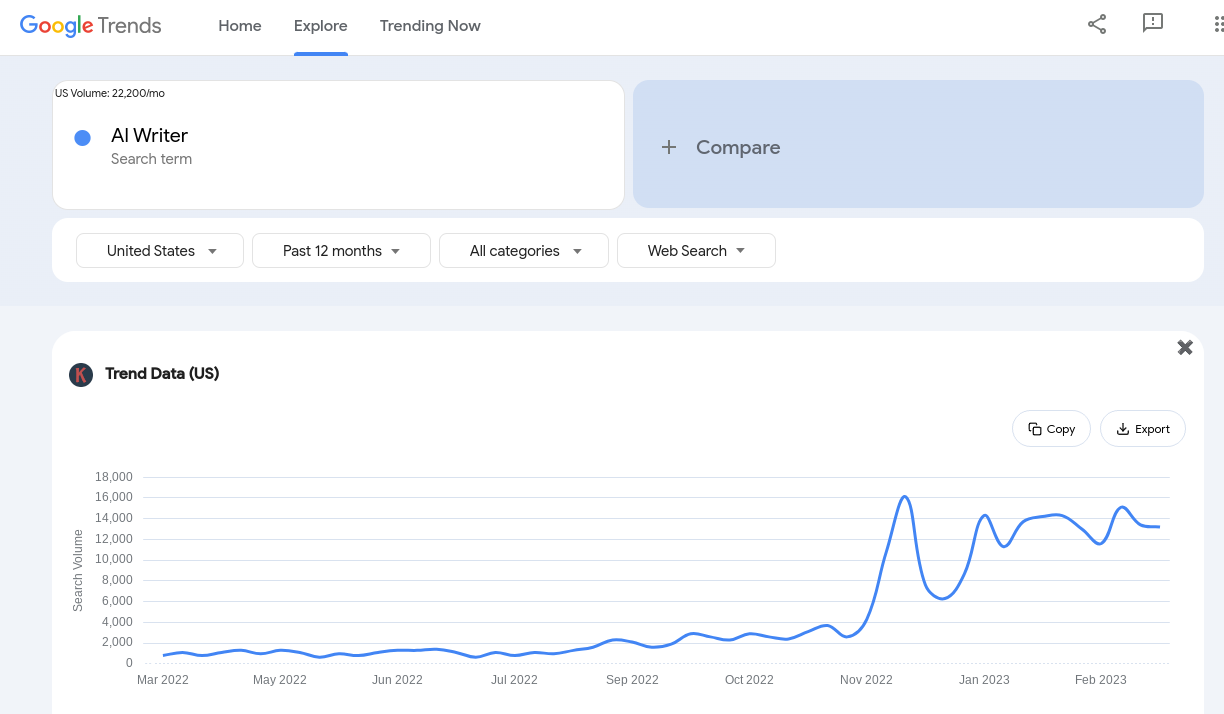

Why is a Keyword Research Report Essential?
An SEO keyword research report offers a detailed analysis of the words and phrases people use when researching topics related to your business. Compiling a keyword report helps with the following:
1. Shapes Your Content Strategy
Identifying the keywords your target customers search for helps you identify their most pressing worries, questions, and goals. These keyword ideas in turn can shape your content strategy.
For example, if you notice a high number of what, why, and how queries in search results, it may mean your target customers lack awareness of their problems and their available solutions. Going forward, you might have to make how-to guides and case studies a priority in your strategy to build their awareness.
2. Helps Identify Your Main Competitors
If you notice during your keyword research process that the same websites tend to rank for the keywords you have selected to target, those are likely your closest competitors.
Knowing the competitors that are outranking you in search results is essential as it shows a standard you must aspire to. If they are ranking for the best keywords in search engines, it must mean that they are doing quite a few things right, which makes them a great target to reverse-engineer.
3. Ensures You Prioritize the Right Tactics
Sometimes the reason you might fail to rank for any keywords with your content is that you’re using the wrong tactics. For example, you may be targeting keywords you can’t rank for because of your low domain rating.
Thankfully, a keyword analysis will show clearly how difficult (or not) it is to rank for a keyword, helping you focus your efforts on attainable goals. On the other hand, pursuing high-volume keywords when you lack the necessary authority leads to frustration and wasted effort.
How to Create a Keyword Research Report
A keyword research spreadsheet is useless if it’s inaccurate or lacks detail. To avoid these pitfalls, here are five essential steps you should take when you conduct keyword research:
1. Identify Relevant Keywords
The first step in any keyword analysis is to find keyword ideas that are related to your business or product. Consider words and phrases associated with your industry and brainstorm topics your target audience may be interested in.
There are several ways you can conduct keyword research without a tool. Otherwise, you can reduce your research time by generating a keyword list from trusted keyword tools like Google Keyword Planner and BrandWell.
Premium tools offer deeper insights and useful keyword data from search results, such as search volume and keyword difficulty, that you need to gauge to increase your chances of successfully ranking for them.
Once you have identified and collected your search terms in a spreadsheet, consider grouping closely related terms into clusters so you can target them in the same pieces of content.
2. Analyze Search Volume
Keyword search volume helps you gauge the search popularity of search terms in your keyword list, helping you decide if they’re viable for SEO.
A keyword has no business value unless a reasonably high number of people search for it. It also should have the potential to drive qualified traffic to your website.
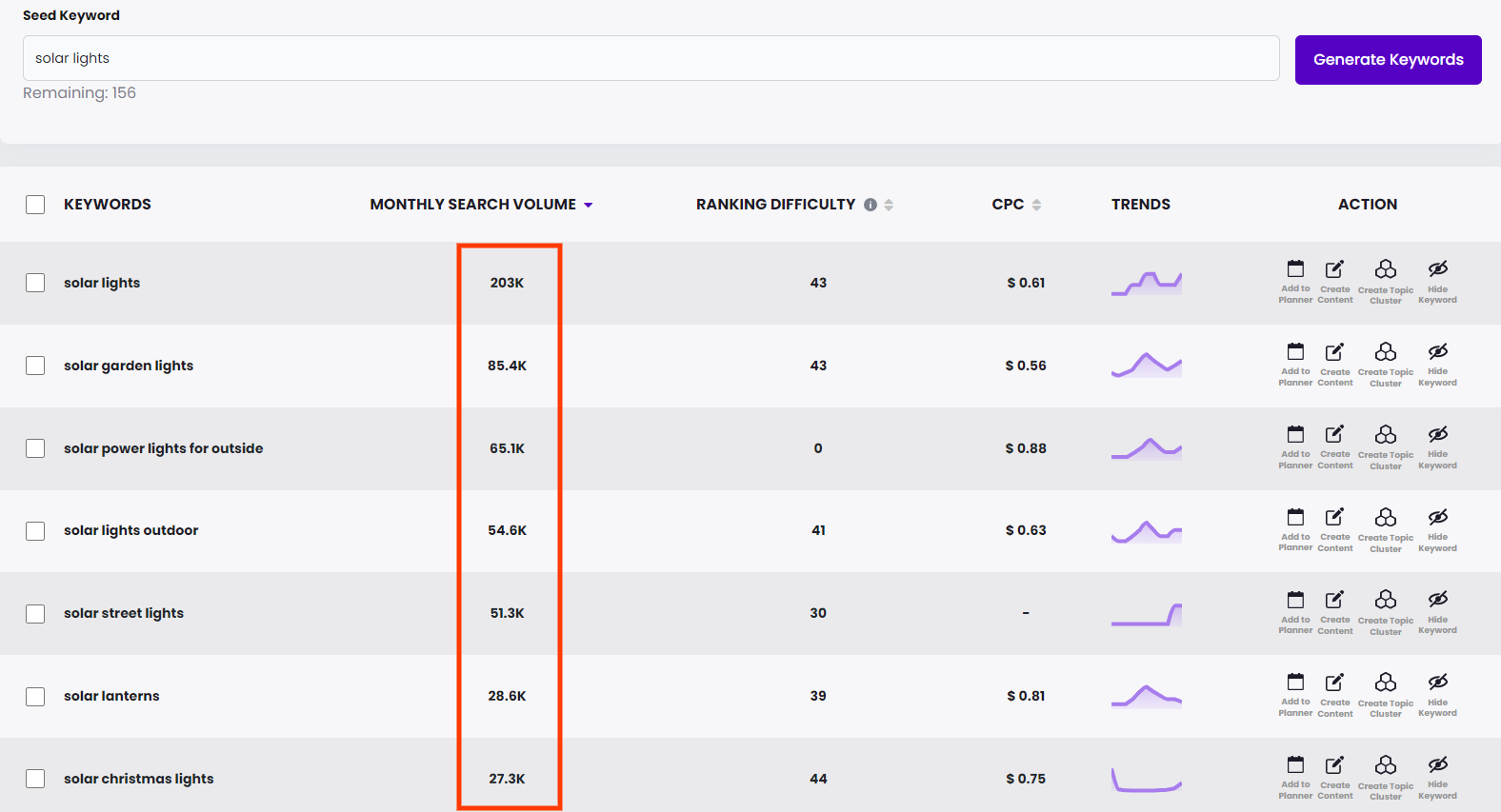

Once you’ve identified relevant keywords, analyze the first keyword data on the list, which is often the monthly search volume.
You should also consider geographic factors when looking at search volume data because certain terms may be more popular in certain countries or regions due to cultural differences or language preferences.
For example, if most of your audience is based in France, then it would make sense to go after French-language keywords like “acheter un ordinateur portable” (buy a laptop) instead of “laptop computer.”
3. Determine Keyword Difficulty
Some keywords are easier to rank for than others. Because of their high search volume, seed keywords that are typically broad in terms of their scope are the hardest to rank for, especially for newer and smaller sites without much domain authority.
The keyword competition levels of your keyword phrases tell you at a glance if you can rank for it or if you should target a less competitive keyword.
Most premium SEO tools have features for determining keyword competition or keyword difficulty. Some refer to it as ranking difficulty. The lower the score, the less competitive the keyword.
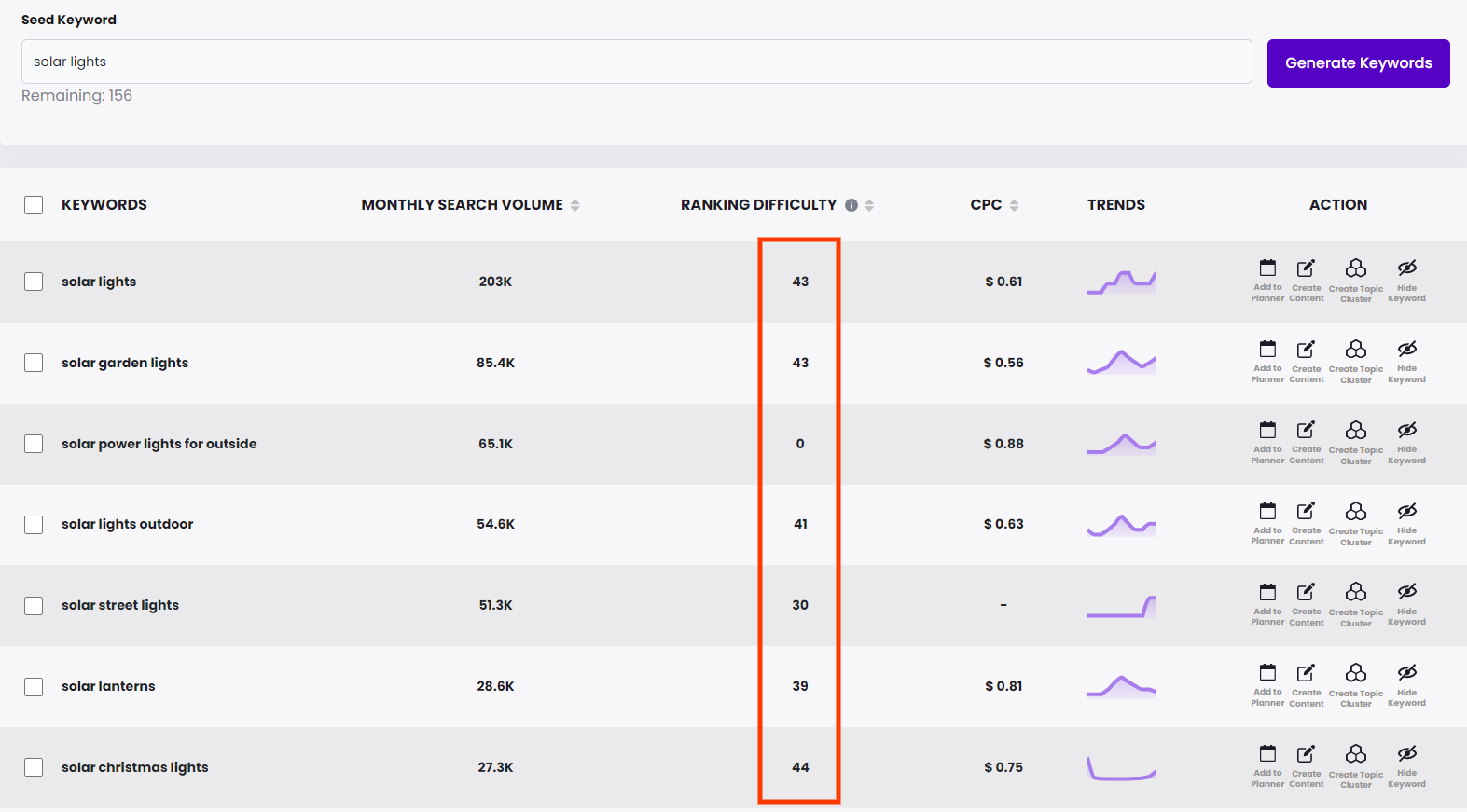

4. Monitor Trends
To ensure the success of your keyword strategy, it’s vital to monitor trends in keyword popularity.
Tools like Google Trends will show you how a topic has trended over time.
A tool like BuzzSumo that tracks mentions of particular terms across social media platforms over a period of time can also help gauge general interest in a topic.
By monitoring changes in search volume over time, you can gauge the relative popularity of your long-tail keywords and adjust your strategy accordingly. It’s also helpful to compare different variations of a single keyword since some might perform better depending on the context and intent behind the query.
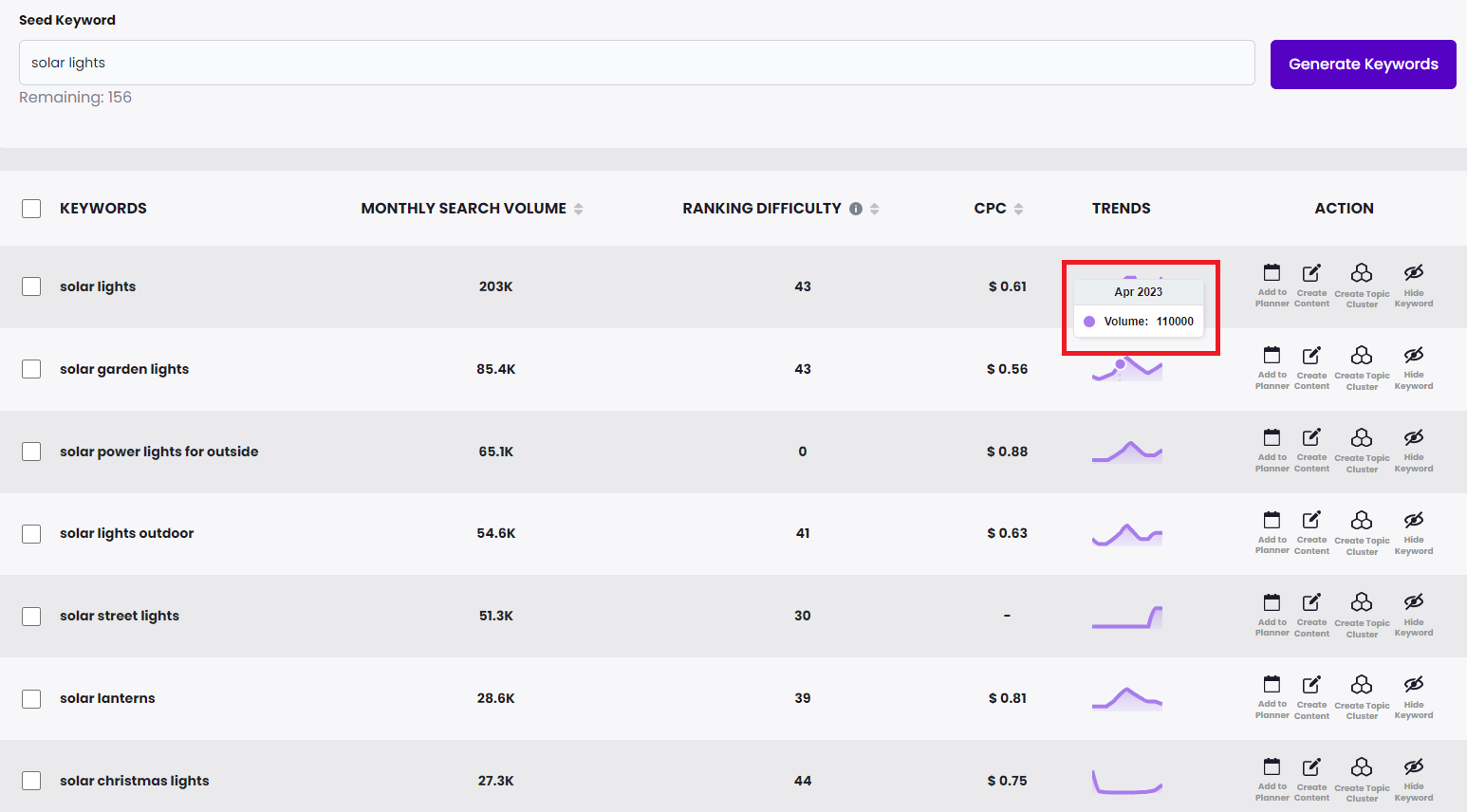

5. Track Competitors
Tracking what long-tail keywords your competitors are targeting is another essential step when compiling a keyword research report – especially if they’re doing better than you in terms of traffic.
Tools such as SpyFu allow you to see what organic keyword phrases your business rivals rank for, while services like Semrush offer insight into paid traffic acquisition.
By monitoring how competitor pages are performing on search engine results, you can determine what’s working and what’s not. This will help you make the necessary adjustments to your own pages. You can even reverse engineer their entire SEO strategy and replicate their success.
Tracking your competitors also means checking their backlinks. After you identify websites that are linking to the competitor page you are hoping to outrank, you can create a better page than theirs and perform outreach to the linking site.
Create Content Straight from Your Keyword Research Report
The best way to find keywords for your SEO strategy is to use a keyword research tool. I’ve already mentioned some of the popular ones like Google’s Keyword Planner, Semrush, and Ahrefs. But what if there was a keyword research tool that is also a content writer? An all-in-one software solution that lets you generate a keyword research report and write in-depth blog articles around those keywords in just a few clicks?
I’m talking about BrandWell — a powerful brand growth engine that helps you:
- Find hundreds of keyword phrases that are relevant to your business,
- Turn those keyword phrases into topic clusters, and
- Write a 3,000-word blog post that is SEO-optimized for each keyword phrase.
With BrandWell, you can ditch all of your other SEO tools as it now integrates a full content intelligence suite into its long-form content writer — automating your entire SEO content strategy from generating a keyword research report to publishing your content online.
FAQs – Keyword Research Reports
What is a keyword research report?
A keyword research report is a detailed analysis of your target keywords. It analyzes monthly search volume, keyword popularity, competition levels, and keywords closely related to your primary target audience. This information helps you create SEO-friendly content, which in turn, increases your business’s visibility online and drives traffic to your website.
What are the elements of keyword research?
Keyword research helps you find keyword suggestions as well as data on their monthly search volume, competition level, and relevance.
Search volume is a measure of a keyword’s popularity.
The competition level, also called keyword difficulty or SEO difficulty, assesses what websites rank for a keyword term to determine how difficult it would be to beat them.
Relevance, on the other hand, assesses whether the traffic a keyword attracts matches your target audience.
The best target keywords are low-volume keywords that are relevant to your seed keywords and are easy to rank for.
How do you write a keyword report?
A keyword research report is a document that outlines the most desirable keyword suggestions for SEO purposes. It should include research into relevant search terms, an analysis of the competition level, and an assessment of potential opportunities to improve rankings.
A keyword research report can also offer tips on how best to optimize existing content with the targeted keywords. Ultimately, the report should be crafted to meet the marketing objectives you have established for your business.
Conclusion
A keyword research report provides insights into what specific words and phrases your target audience uses in their web searches, how often they are being used, and which ones are most popular. Creating these reports helps make your SEO both more strategic and organized — a powerful combination that leads to better results.
Researching keywords doesn’t have to be hard. With a powerful brand growth platform like BrandWell, all it takes is just a few clicks to research keywords and turn them into well-written content that propels your business to the top of the SERPs. Try it today!

UNLOCK YOUR POTENTIAL
Long Headline that highlights Value Proposition of Lead Magnet
Grab a front row seat to our video masterclasses, interviews, case studies, tutorials, and guides.



